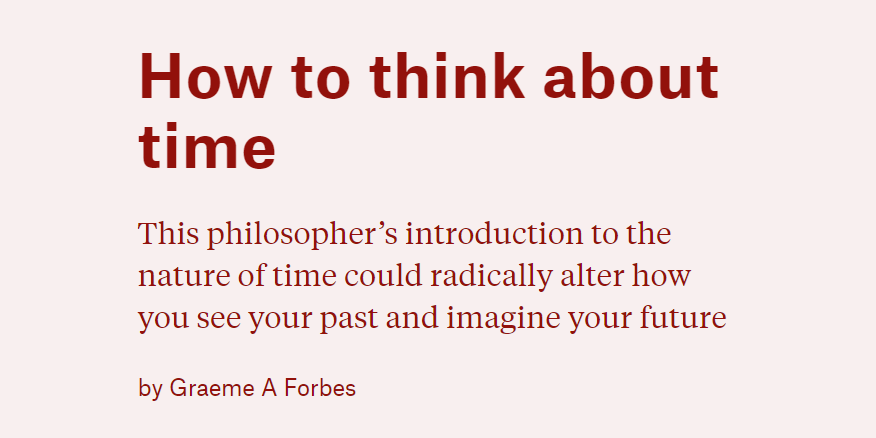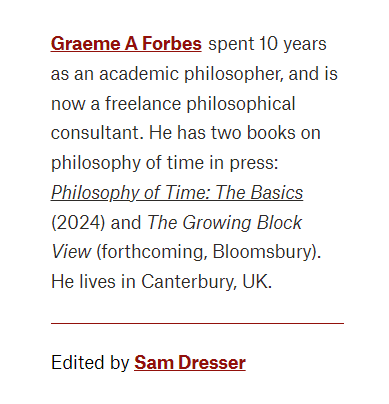Welcome to DU!
The truly grassroots left-of-center political community where regular people, not algorithms, drive the discussions and set the standards.
Join the community:
Create a free account
Support DU (and get rid of ads!):
Become a Star Member
Latest Breaking News
General Discussion
The DU Lounge
All Forums
Issue Forums
Culture Forums
Alliance Forums
Region Forums
Support Forums
Help & Search
The DU Lounge
Related: Culture Forums, Support ForumsHow to think about time


https://psyche.co/guides/how-to-think-about-time-to-understand-your-hopes-and-regrets



Stretch out your arms to their fullest extent getting the tips of your fingertips on your right hand as far from the fingertips on your left hand as you can. Depending on where you are reading this, that might have been embarrassing, but you will feel like you’ve taken up more space than when you scrunch yourself into a tiny ball. Now do the equivalent in time… You can’t, right? We can spread out in space, but not in time. In time, we experience one thing after another, in a sequence of episodes. This is one of the striking things about time. It does something that space doesn’t do. It passes. You live in time, and whether or not you think about it, this difference between space and time affects how you act, what you can choose to do, and poses challenges of how to deal with the things you didn’t do or should have done differently. As Augustine of Hippo observed, it seems like we understand time until we try to articulate what it is.
When you stretched your arms out just now (you can take them down, if you haven’t already), you were varying across space. Your body filled up a region of space, but how it filled it was different in different places. Some of that space had fingers in it, some an arm, some an elbow, some a shoulder. Is change just different events filling up different bits of time? This view would be that your birth is in one bit of time, your reading this in another, and your death (hopefully) in another, much later time. Sure, we experience these as a sequence of episodes, but that’s something about how people experience things, rather than about what change really is. Let’s call this the temporal variation view. It goes with a ‘static’ view of time. Things vary across time, but they don’t change how they vary.
The other view is that change has no spatial analogue. Time passing might involve varying across space, but there is something fundamentally different about it. Let’s go back to your birth being at one time and your reading this article at another. We can represent them on a timeline. But that’s missing something. It’s missing the change. And that missing ingredient, whatever it is that the timeline with different events at different places lacks, is what is required for time to really pass. Call this view of change ‘McTchange’ after the early 20th-century philosopher J M E McTaggart, who argued that change couldn’t be mere temporal variation (and, also, that change is contradictory). It goes with a dynamic view of time, because time itself McTchanges as stuff successively happens.
Past and future
Once stuff has happened, it becomes the past. And there’s a sense in which you’re stuck with it then. You can dress it up in different ways, but whether you got out of bed and did the training, whether you said those hurtful things, and whether you crossed the finish line on the day, are now unalterable things that happened. In addition to the difference between change over time and variation across space, there’s a difference between the past and the future. We’re stuck with the past in a way we might not be stuck with the future. Maybe there’s nothing you can do about the future; perhaps you’ve set off a sequence of events that are now unfolding outside of your control. But at least sometimes you can influence the future, right? Your chances of making something happen in the future seem a lot higher than your chances of making something happen in the past. This contrast is called ‘the open future’, where, usually, it is assumed the past isn’t similarly open.
snip
InfoView thread info, including edit history
TrashPut this thread in your Trash Can (My DU » Trash Can)
BookmarkAdd this thread to your Bookmarks (My DU » Bookmarks)
0 replies, 298 views
ShareGet links to this post and/or share on social media
AlertAlert this post for a rule violation
PowersThere are no powers you can use on this post
EditCannot edit other people's posts
ReplyReply to this post
EditCannot edit other people's posts
Rec (3)
ReplyReply to this post